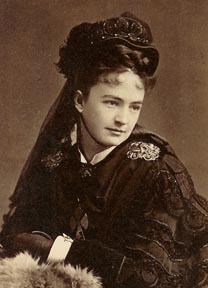In Libbie's own words

In Libbie's own words
WALK ALONE IN THE SHADOW

source: Elizabeth Custer, "Boots and Saddles": Or Life in Dakota with General Custer, chapter XXIX, University of Virginia Library
Not the shadow of an anxiety, nor the faintest sign of dread of the coming journey over the snow again came into his face. He left me with the same words with which he always comforted me: "Be sure, Libbie, it's all for the best; you know we always find it so in the end." With these farewell words he stepped into the sleigh -- which he knew well might be his tomb.
(...)
On Sunday afternoon, the 25th of June, our little group of saddened women, borne down with one common
weight of anxiety, sought solace in gathering together in our house. We tried to find some slight surcease from trouble in the old hymns: some of them dated back to our childhood's days, when our mothers rocked us to sleep to their soothing strains. I remember the grief with which one fair young wife threw herself on the carpet and pillowed her head in the lap of a tender friend. Another sat dejected at the piano, and struck soft chords that melted into the notes of the voices. All were absorbed in the same thoughts, and their eyes were filled with far-away visions and longings. Indescribable yearning for the absent, and untold terror for their safety, engrossed each heart. The words of the hymn,
"E'en though a cross it be,
Nearer, my God, to Thee,"
came forth with almost a sob from every throat.
At that very hour the fears that our tortured minds had portrayed in imagination were realities, and the souls of those we thought upon were ascending to meet their Maker.
On the 5th of July -- for it took that time for the news to come -- the sun rose on a beautiful world, but with its earliest beams came the first knell of disaster. A steamer came down the river bearing the wounded from the battle of the Little Big Horn, of Sunday, June 25th. This battle wrecked the lives of twenty-six women at Fort Lincoln, and orphaned children of officers and soldiers joined their cry to that of their bereaved mothers.
From that time the life went out of the hearts of the "women who weep," and God asked them to walk on alone and in the shadow.
"They died with their boots on", 1941 - legendary scene with Flynn-DeHavilland
